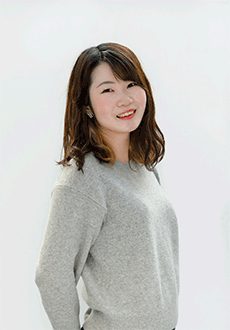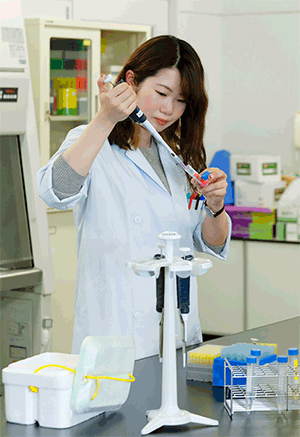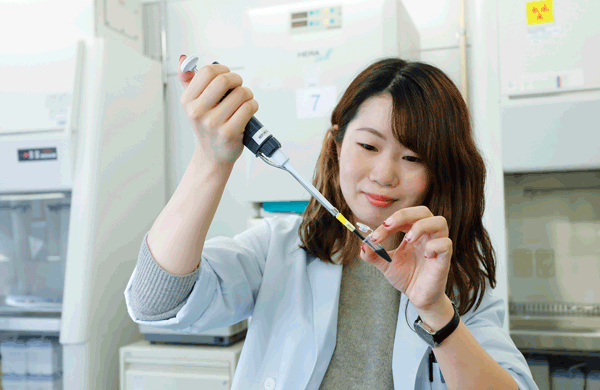Aspiring to solve agricultural problems with the power of plants and microorganisms (Kie Kumaishi, Technical Staff II)

Many women active in a variety of fields work at RIKEN BRC. We interviewed 12 of these women for their insights on how they continue to flourish with work styles that fit their particular lifestyles.
In this interview, we spoke with Kie Kumaishi, Technical Staff on the Plant-Microbe Symbiosis Research and Development Team.
She learned about cultivar improvement in a television drama she saw when she was in elementary school and decided to enter the research profession. She spoke to us about her thoughts on work, motivation, and hopes for the future, among other topics.
Profile
- Kie Kumaishi
- Technical Staff II, Plant-Microbe Symbiosis Research and Development Team
- Kumaishi joined RIKEN in 2018. When she was in vocational school, she carried out research about the genes involved in the evolution of parasitic plants that take water and nutrients from other plants. Currently, she is primarily in charge of gene expression analysis and bacterial and fungal floral analysis using next-generation sequencing for the symbiotic relationship between plants and soil microorganisms.
A drama influenced my decision to be a research profession. I aspire to resolve food issues by improving cultivars.
I decided to become a technical staff because of a TV drama I saw when I was in the upper grades of elementary school. The story was about a high school student who became interested in improving vegetable cultivars.
I was struck by the unfamiliar term “cultivar improvement”. When I looked into it, I learned that improving plant cultivars can help solve food problems and that there are researchers working on it.
I was also really shocked to learn then that there were people starving because of food shortage. I began to think about what needed to be done to solve food problems, and this thought is still at the center of everything for me.
After I graduated high school, I went to a four-year vocational school so that I could learn about the physiology of plants and molecular biology. I chose a technical college, which gives you the designation of “Advanced Diploma,” because I wanted to build up my experience with experiments, and there was much more time spent on hands-on practice compared with a university. The techniques I learned in actual practice have been extremely helpful in my job.
Luckily, when I was a student led to RIKEN; I’m grateful for an environment that makes it easy even for young people to work.


When I was a student, it was all just an unknown world. I was thrilled no matter what the result was, and the sheer interest of the research was exhilarating. The most interesting part was the practical learning for plant pathology. We inoculated plants with pathogenic microbes and observed the infected plants. Plants responded by shedding the infected leaves that had become partly gangrenous. I was very impressed by the defense response and life force of plants.
In my graduation research, I worked in the RIKEN Center for Sustainable Resource Science’s Plant Immunity Research Group and carried out research using parasitic plants. Parasitic plants live off of other plants and absorb their water and nutrients to live. Since the host plant dries up and dies, it causes major agricultural damage primarily in semi-arid regions in Africa. For this reason, parasitic plants are considered a threat to the world’s food security.
This graduation research was the first time that I was involved with RIKEN, and my adviser at that time is actually the leader of the team that I currently belong to. After graduating, I worked in other research labs, but when the new research lab was formed, I was asked to join, and I’m still here.
All of the lab members are very easygoing, and it’s easy to share my opinion and ask about anything I don’t understand. The workplace environment also makes it easy for everyone to focus on their work.
I’d rather regret doing something than not doing something. I’m going after new goals.
Someone with more experience in life than I have told me “Do everything you want to do while you are young, and live your life without regrets”. So, I believe in this advice, and challenge myself to do many things not only at work but also in my personal life.
For example, living abroad. When I went to San Francisco for the first time for overseas training at 19, I was surprised and impressed by everything I saw was different. I thought about the kinds of experiences I could have if I lived in an environment like this, and ever since then, ever since then, traveling abroad has become one of my hobbies.
Visiting these different countries made me want to live abroad sometime. I designated 2022 as my year to prepare, and am focusing on input like studying English and compiling information.
I also want to get my motorcycle driver’s license. No matter what kind of life I walk, I hope to believe in my own possibilities and keep in mind that it’s better to regret what I’ve done than what I’ve not done.
